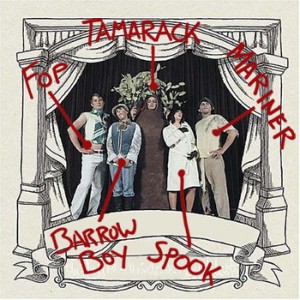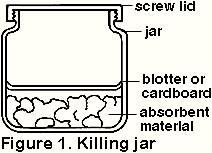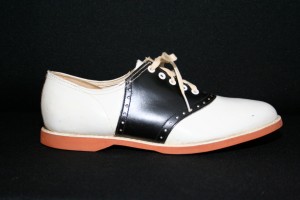The Annotated Decemberists No. 2: “Shiny”
 Perhaps no band’s lyrics better lend themselves to pseudo-academic analysis than those of The Decemberists. The Annotated Decemberists is an attempt to puzzle through the Portland, Oregon, group’s entire catalog song by song—examining all the obscure vocabulary, historical references and poetic subtext—or go crazy trying.
Perhaps no band’s lyrics better lend themselves to pseudo-academic analysis than those of The Decemberists. The Annotated Decemberists is an attempt to puzzle through the Portland, Oregon, group’s entire catalog song by song—examining all the obscure vocabulary, historical references and poetic subtext—or go crazy trying.
In his typical, understated fashion, The Decemberists‘ songwriter Colin Meloy has said little about this ballad other than, “This is a song about a gypsy.” In it, a dejected narrator pines over a young carny with tan skin, vintage footwear and strangely bewitching eyes.
“Shiny”
From 5 Songs (2003)
By the bumper cars
In the pretty twining[1] light
I may have gone too far
I may have gone too much, too long
I’m a dull and witless boy[2]

At the after bars
Think I was sullied[3] by a dream
In the killing jar[4]
You and me at war, at arms
All falling in embrace
Tell me why you lied
And what it is you do to keep your eyes all shiny[5]
A tawny[6] gypsy girl
Sleeping blanketed by stars
Beneath the Tilt-A-Whirl[7]
Where we were coyly caught alone
All fumbling with your blouse
Tell me why you lied
And what it is you do to keep your eyes all shiny

And in the rollercoaster din
By the parachutes in saddle shoes
You break your shins[8]
But I have never seen two eyes so shiny
And the sullen beery swine
Who try to tangle you
In sullen beery balls of twine
Have they ever seen two eyes so shiny?
Boys in denim vests
Smoking cigarettes between
The bootblack[9] fingertips
Sweetly tipsy by the half light
The light and the half light[10]
Tell me why you lied
And what it is you do to keep your eyes all shiny
- “vt. to twist together; intertwine; interlace.” The narrator seems to be describing twilight as the sunset and night being woven together, a theme that is revisited in the final verse. (See note 10.)↑
- “A Dull and Witless Boy” is also the name of Meloy’s Tumblr blog.↑
- “vt. to soil, stain, tarnish, or besmirch, now esp. by disgracing.”↑
- Entomologists use these devices to kill insects without smashing their specimens. The simplest version is just a sealable glass container with a thin layer of plaster of Paris, which can absorb and slowly release insecticide. In this stanza, the narrator appears to be describing how he was unable to enjoy himself because he was troubled by a dream of being trapped with the song’s love interest in a killing jar, where they died in each other’s arms, although there is confusion about whether they were fighting or embracing.”↑
- The good folks over at songmeanings.net have all kinds of theories about the song’s key image. Some wrote that it implies the subject often has tears in her eyes. One poster assumed the narrator was describing the effects of certain drugs. Several others insist that the line refers to an involuntary, biological reaction that causes your eyes to “secret a fluid” whenever you’re attracted to someone. (“This is true,” one writes. “Look it up.” (Um, we did, and all we could find was evidence that the rush of adrenaline tends to cause the eyes to dilate, which might help explain why we find things with big pupils cute.)) At any rate, it’s this blogger’s opinion that she simply has pretty eyes.↑
- “adj. brownish-yellow; tan.”↑
- According to Wikipedia, Sellner Manufacturing of Faribault, Minnesota, has produced more than 1,000 of these nausea-inducing carnival rides since 1927. Since unpredictability and chaos theory govern the rider’s experience, it makes an especially apropos metaphor for the whirl of romance, dontchathink?↑
- This probably doesn’t mean she literally gets her tibias broken. More likely, Meloy is utilizing an old slang term for borrowing money.↑
- We’ll go ahead and infer that the narrator is describing carnival workers with fingers so dirty they’re as black as shoe polish.↑
- A reference to William Butler Yeats’ 1899 poem “Aedh Wishes for the Cloths of Heaven”:
Had I the heavens’ embroidered cloths,
Enwrought with golden and silver light,
The blue and the dim and the dark cloths
Of night and light and the half light,
I would spread the cloths under your feet:
But I, being poor, have only my dreams;
I have spread my dreams under your feet;
Tread softly because you tread on my dreams.Aedh is one of three archetypal personae (Yeats described them as “principles of the mind”) in the Irish poet’s The Wind Among the Reeds. Adeh is a lovesick figure obsessed with a beautiful woman. He is often compared to the knight-at-arms in John Keats’ “La Bella Dame Sans Merci,” who becomes sick and pale after being abandoned by a mysterious, bewitching lady. The song’s narrator seems to be casting his lot with these pitiful romantics, remaining fixated on the unobtainable beauty of this gypsy with the shiny eyes.↑
2 Replies to “The Annotated Decemberists No. 2: “Shiny””